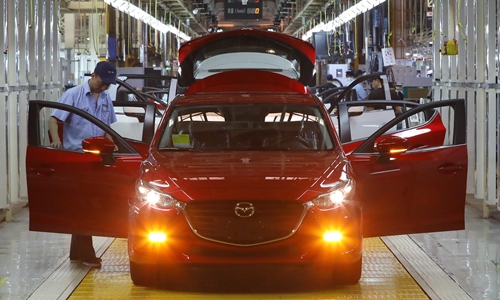HOME >> SOURCE
China’s Q1 car sales to drop 60% due to factory closures
By Yin Yeping Source:Global Times Published: 2020/2/24 18:28:41

A worker inspects a car at an auto factory in Nanjing, capital of East China's Jiangsu Province. Photo: cnsphoto
Despite the gradual restart of businesses in China due to the COVID-19 epidemic, slackened buying power and sharply reduced production capacity mean the auto industry's recovery is set to be a long-term process.Industry insiders said that although the auto industry's recovery rate is relatively high, especially outside central Hubei Province, the sales volume of passenger vehicles in the first quarter of this year will witness a swooning of at least 60 percent.
Auto sales are expected to fall at least 90 percent in February, 60 percent in March and 40 percent in April, Jia Xinguang, a veteran car industry observer, told the Global Times on Monday, noting that this is an "optimistic" estimate.
"Due to the impact of the epidemic, sales are weak and dealers cannot generate positive cash flows," Jia said.
Another concern is that car dealers now have limited vehicles in their inventories.
Cui Dongshu, secretary general of the China Passenger Car Association, told the Global Times on Monday that some dealers' inventories are very tight as a result of production disruption.
"Hubei is home to the final assembly lines for automobiles, accounting for one-tenth of the country's car production chain, and while this part of the process could be moved to a less affected area, it may not be cost-effective to many car makers," Cui said.
Industry analysts are in agreement that auto production could gradually recover in April, though sales are expected to take much longer to recover due to the epidemic's impact on purchasing power.
To ease the pain on the industry, local governments have been launching a slew of favorable policies and guidelines, setting a clear direction for the industry's future development.
The National Development and Reform Commission has introduced a "smart car innovation development strategy." It said that by 2025, an industrial ecology, infrastructure and regulations will be in place, in addition to the Chinese standard for smart car technology innovation, and a product supervision and network security system.
Xu Haidong, assistant secretary-general of the China Association of Automobile Manufacturers, told the Global Times on Monday that the new strategy will offer important guidance for intelligent networked vehicles at the national level, but that it will give little boost to consumption power.
"If the outbreak could be contained in March, auto sales would recover in the second quarter, but the first half of this year would be slightly lower than the same period last year," Xu said.
Posted in: INDUSTRIES,MARKETS